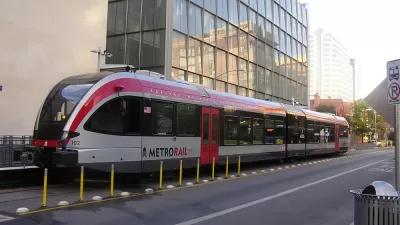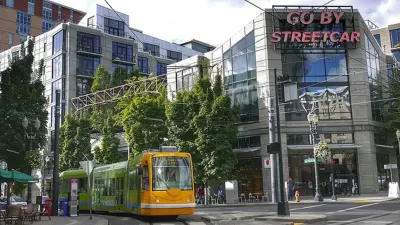In a pair of articles, Jonathan Maus reports on the final moments of the SW Corridor Light Rail Project, as project supporters deals with a loss at the ballot box.
"The project was set to receive $975 million from the Metro funding measure that failed at the ballot box on November 3rd. Without the money, there’s no path forward for the project and officials say it will be put to bed until further notice," writes Maus in a recap of the final meeting of the SW Corridor Light Rail Project Steering Committee, comprising elected officials from around the region.
A separate article by Maus recaps the final meeting of the Southwest Corridor Light Rail Community Advisory Committee , comprising citizen volunteers.
According to information attributed to Tyler Frisbee, Metro’s policy and federal affairs policy manager, Measure 26-218 failed to receive voter support in all three of the counties where the ballot measure appeared. "We had stronger support along areas where some of the major corridors were. So, stronger support out along TV Highway. Frankly, not great support from Southwest Portland," says Frisbee in the article.
Maus offers insight into how voter support failed to materialize, even in the part of the region the project was supposed to benefit:
After contacting several SW Portland transportation activists, I got the sense that the light rail project never had a strong, homegrown constituency. SW Portland has been underinvested in for decades. It has the least sidewalk coverage of any Neighborhood Coalition in the city — over 65% of its arterials and collector streets lack sidewalks — and its stormwater infrastructure is inadequate to support improving that network. It doesn’t have a connected bike network, large swaths of southwest have no bicycling facilities at all.
The Southwest Corridor Light Rail plan would have added 11 miles of light rail and 13 stations between Downtown Portland and Bridgeport Village, making the trip in 30 minutes.
FULL STORY: TriMet GM stays positive as reality of SW Corridor project loss settles in

Alabama: Trump Terminates Settlements for Black Communities Harmed By Raw Sewage
Trump deemed the landmark civil rights agreement “illegal DEI and environmental justice policy.”

Planetizen Federal Action Tracker
A weekly monitor of how Trump’s orders and actions are impacting planners and planning in America.

The 120 Year Old Tiny Home Villages That Sheltered San Francisco’s Earthquake Refugees
More than a century ago, San Francisco mobilized to house thousands of residents displaced by the 1906 earthquake. Could their strategy offer a model for the present?

Ken Jennings Launches Transit Web Series
The Jeopardy champ wants you to ride public transit.

BLM To Rescind Public Lands Rule
The change will downgrade conservation, once again putting federal land at risk for mining and other extractive uses.

Indy Neighborhood Group Builds Temporary Multi-Use Path
Community members, aided in part by funding from the city, repurposed a vehicle lane to create a protected bike and pedestrian path for the summer season.
Urban Design for Planners 1: Software Tools
This six-course series explores essential urban design concepts using open source software and equips planners with the tools they need to participate fully in the urban design process.
Planning for Universal Design
Learn the tools for implementing Universal Design in planning regulations.
Clanton & Associates, Inc.
Jessamine County Fiscal Court
Institute for Housing and Urban Development Studies (IHS)
City of Grandview
Harvard GSD Executive Education
Toledo-Lucas County Plan Commissions
Salt Lake City
NYU Wagner Graduate School of Public Service





























